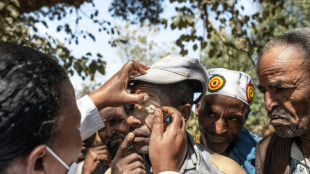
-
 Trump's deportation operation underway, hundreds of migrants arrested: White House
Trump's deportation operation underway, hundreds of migrants arrested: White House
-
Half kung-fu, half opera: China's captivating 'heroes' dance

-
 How the Taliban restrict women's lives in Afghanistan
How the Taliban restrict women's lives in Afghanistan
-
Frenchman on Indonesian death row to be sent home

-
 Stock markets build on Trump rally, yen climbs after BoJ cut
Stock markets build on Trump rally, yen climbs after BoJ cut
-
Zverev defends injured Djokovic after Australian Open boos

-
 Bank of Japan hikes interest rate to 17-year high, boosts yen
Bank of Japan hikes interest rate to 17-year high, boosts yen
-
Aryna Sabalenka: the complete player in search of history

-
 Madison Keys: from teenage prodigy to Melbourne finalist at 29
Madison Keys: from teenage prodigy to Melbourne finalist at 29
-
Sabalenka, Keys promise thunderous slugfest in Australian Open final

-
 Catalonia eyes reversal of business exodus after big bank returns
Catalonia eyes reversal of business exodus after big bank returns
-
Hong Kong revives border village in alternative tourism push

-
 Coquard wins Down Under photo finish as Romo retains tour lead
Coquard wins Down Under photo finish as Romo retains tour lead
-
Tajikistan launches crackdown on 'witchcraft' and fortune-telling

-
 Djokovic unsure if Murray partnership will go on after Melbourne exit
Djokovic unsure if Murray partnership will go on after Melbourne exit
-
Deadly teen knife crisis UK's 'new normal'

-
 LeBron, Davis lead Lakers romp over Celtics
LeBron, Davis lead Lakers romp over Celtics
-
Sumo walks 'tightrope' with first overseas events in 20 years

-
 Djokovic retires hurt to send Zverev into Australian Open final
Djokovic retires hurt to send Zverev into Australian Open final
-
Farrell 'still finding out' about 'intriguing' France at Racing

-
 Taekwondo star Hamidi sacrifices her freedom to battle the Taliban
Taekwondo star Hamidi sacrifices her freedom to battle the Taliban
-
Misfiring Kane needs to shake off slump as Bayern visit Freiburg

-
 Bank of Japan hikes interest rate to 17-year high, signals more
Bank of Japan hikes interest rate to 17-year high, signals more
-
Barca hoping to end torrid Liga form against improving Valencia

-
 Man City start tough run against Chelsea, Spurs aim to halt slide
Man City start tough run against Chelsea, Spurs aim to halt slide
-
Lyon fight for return to Champions League amid off-field worries

-
 Bangkok air pollution forces 352 schools to close
Bangkok air pollution forces 352 schools to close
-
Asian markets build on Trump rally, yen climbs after BoJ cut

-
 Despite truce, Lebanese from devastated Naqura cannot go home
Despite truce, Lebanese from devastated Naqura cannot go home
-
Tax change sows anger on England farms

-
 Peers and Gadecki win Australian Open mixed doubles
Peers and Gadecki win Australian Open mixed doubles
-
'I rip out my lashes to ease pain': Eye disease afflicts Ethiopia

-
 Survivors strive to ensure young do not forget Auschwitz
Survivors strive to ensure young do not forget Auschwitz
-
Asian markets build on Trump rally, yen steady ahead of BoJ

-
 'Nerve-racking': Inside the aerial battle to tame Los Angeles fires
'Nerve-racking': Inside the aerial battle to tame Los Angeles fires
-
Ice in the sky: Thailand's fight against air pollution

-
 Climate change cooks up Japanese 'cabbage shock'
Climate change cooks up Japanese 'cabbage shock'
-
Smog chokes Baghdad as oil-fired factories belch out smoke

-
 Strong winds wreak havoc before Torrey Pines 2nd rd halted
Strong winds wreak havoc before Torrey Pines 2nd rd halted
-
'Living in a cage': West Bank checkpoints proliferate after Gaza truce

-
 OpenAI unveils 'Operator' agent that handles web tasks
OpenAI unveils 'Operator' agent that handles web tasks
-
Bamboo farm gets chopping for US zoo's hungry new pandas

-
 Fear in US border city as Trump launches immigration overhaul
Fear in US border city as Trump launches immigration overhaul
-
Red herring: Why Trump wrongly blames a fish for LA wildfires

-
 Colman kicks off Sundance as film world reels from LA fires
Colman kicks off Sundance as film world reels from LA fires
-
Alien hunting? Look under sea, says Republican congressman

-
 242 mn children's schooling disrupted by climate shocks in 2024: UNICEF
242 mn children's schooling disrupted by climate shocks in 2024: UNICEF
-
Washington's 'Terminator' Daniels one win away from NFL history

-
 US Republicans pressure Democrats with 'born-alive' abortion bill
US Republicans pressure Democrats with 'born-alive' abortion bill
-
Djokovic faces Zverev semi-final test in pursuit of 25th Slam title


Tajikistan launches crackdown on 'witchcraft' and fortune-telling
In a block of flats in Tajikistan's capital Dushanbe, a turbaned woman cautiously opened the door of her apartment a chink, letting out a waft of incense.
"I'm not taking on new clients. It could be a set-up," she says, as she closes the door again and locks it.
"I risk a heavy fine. I do not want people outside on my landing," speaking through the door.
A majority Muslim country in Central Asia, mountainous and impoverished Tajikistan has recently launched a crackdown against fortune tellers, clairvoyants, mediums and "witches".
Practitioners of the occult are keeping a low profile to avoid arrest and public shaming because of a government-led campaign against them.
Tajik police have stepped up raids against what they call "parasites engaged in some of the most detestable activities imaginable -- divination and witchcraft".
Other countries in Central Asia are also cracking down on what have become widespread practices with roots in pre-Islamic traditions.
- Thousands of arrests -
The fight against occult practices is part of wider strict controls imposed in the authoritarian country, which is seeking to curb both radical Islam and ancestral beliefs.
"Illegal religious teaching leads to scams, divination and witchcraft. Tajiks! The Prophet categorically forbade going to diviners and sorcerers," President Emomali Rakhmon, who has ruled the country since 1992, said last year.
Rakhmon also last year announced the arrest of 1,500 people "engaged in witchcraft and divination" as well as "more than 5,000 mullahs" who promised healing through prayer.
A repeat offence is now punishable by two years' imprisonment and a fine of 12,800 euros ($13,300) -- the equivalent of six years' average salary for a Tajik.
Witches and fortune tellers have adapted to avoid police raids.
"I no longer receive people in my home. I go to them," Adalat, a 56-year-old fortune teller, said during a session on the outskirts of Dushanbe.
She swung a string of pearls over some instructions scribbled on a piece of paper, mumbling a few words after asking her client some questions.
She said she is particularly skilled at reconciling fighting couples and seeing their future.
"Even as a child, I was tormented by nightmares which made me want to help people. But I only show my gift to people close to me," she said.
The price of consultations can range from a few euros to gold jewels depending on the client requests but Adalat said she "cannot live" off her fortune telling and relies on money sent to her by her son who works in Russia.
- 'Social inequality' -
One of her clients, Gulbakhor, said she had "turned to fortune tellers and healers mainly because of health problems".
"It's cheaper than conventional medicine, which is very expensive," the 42-year-old housewife told AFP.
Since the fall of the Soviet Union and a civil war in the early 1990s, Tajikistan has been plunged into poverty.
According to Mehrigiul Ablezova, a professor of sociology at the American University of Central Asia, "the attraction of witchcraft and fortune-telling may be linked to social inequality and a lack of access to public services".
"In countries where health or welfare systems are limited, people may seek alternative sources of treatment and support," she told AFP.
She said repression alone would not be enough to counteract these "deeply rooted traditions and beliefs in Central Asia that predate the introduction of Islam".
O.Lorenz--BTB
